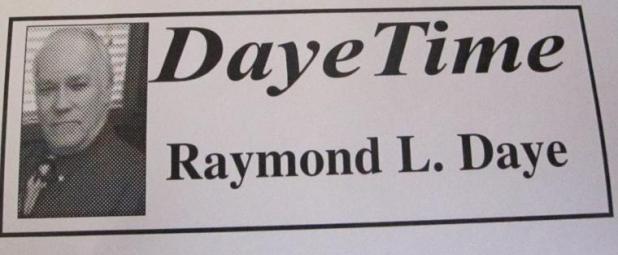
DayeTime: A look at 'seasonal sensitivities'
It is that time of year when “political correctness” rears its -- can we say “ugly” or should we say “less beautiful” -- head.
Those of us who proudly own and present our religion have no problem with wishing anyone who passes by a “merry Christmas.”
Some -- and around here it is very few -- have a problem with the first syllable of the second word. They insist on being told to have a “happy holiday,” if you must say anything to them at all.
I call this, and other such responses, “seasonal sensitivities.”
Don’t let these Scrooges rob you of your seasonal joy. “Bah, humbug” to the lot of them.
I was raised to be tolerant -- not accepting, mind you -- of different beliefs. Everyone has a right to their own religious beliefs, including the right to NO belief.
I find the super-sensitive “don’t you dare say Christmas” crowd to be a bit selfish and paranoid.
When I tell someone “Merry Christmas,” I am not planning to abduct them, drag them to the nearest bayou and forcibly baptize them in the name of the Father, Son and Holy Ghost. I just want to express the joy of this season.
I, personally, find that joy in a certain set of beliefs that date back a few thousand years to a tiny suburb of Jerusalem. Others may find their seasonal joy in half-price sales.
I believe their joy is short-lived while mine is eternal. However, that is not a discussion I intend to pursue when I pass someone in the aisle of the local department store or greet someone while walking on the sidewalk.
There are other holidays observed at this time of year.
Hanukkah, the Jewish “Festival of Lights,” began this past Sunday (Dec. 2) and ends this coming Monday (Dec. 10). It has been around for almost 2,200 years.
One of Jesus’ best-known sermons was delivered during His observance of Hanukkah -- His “light of the world” sermon.
Kwanzaa is a relatively new festival first observed in 1966-67. It begins on Dec. 26 and ends Jan. 1. It is named after the Cuanza River in Angola -- the African nation, not the state penitentiary.
Of course, the oldest celebration during this season would be of those tribes who observed the winter solstice -- when the sun is the farthest away and the nights are the longest. The solstice falls on Dec. 21 this year.
The Norse called their festival Jol (pronounced "yole"), which became Geol in Old English and eventually Yule.
In case you may not have noticed, there is another Christmas word that is apparently derived from this pagan feast. It rhymes with “holly.”
Those in the anti-religion segment of our society aren’t the only ones who can be hyper-sensitive and intolerant this time of year.
Many Christians get up in arms if a business has “Merry Xmas” on its sign or if a friend uses the term in a greeting card.
Contrary to many’s belief, the term is not necessarily an attempt to “take Christ out of Christmas.” It is an abbreviation of Christ, using the Greek letter “chi,” which is X in the English alphabet.
Xmas is generally considered a less proper way to refer to the holiday even among the secular etiquette mavens. From a solely personal observation, I don’t see it being used as much now as it was a few decades ago.
While some non-Christians may feel more at ease with the term, the original intent was not to eliminate Christ from the holiday.
Christ has been abbreviated as XP (Chi Rho) for centuries.
The first use of Xmas in English is believed to have been in the Anglo-Saxon Chronicles of 1100 as Xp’esmaesse.
It isn’t much of an abbreviation when the shorthand version is longer than the actual word. Then again, the Saxons were the larger tribe but the country ended up being named after the Angles.
So, if someone wishes you a “Merry Xmas,” don’t assume they are being anti-Jesus.
Okay, they probably are, but give them the benefit of the historical doubt.
After all, it is the season of giving.
